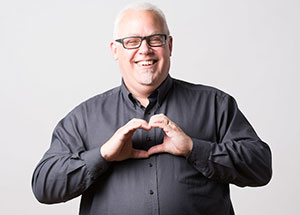Getting to Know Andy Johnson
This week we sit down with our resident Team Health Specialist and Coach to Quiet Leaders, Andy Johnson. Those who know Andy say he is a compelling speaker, and thoughtful company advisor who is a treasure trove of knowledge, anecdotes, and understanding. Andy talks with us about his favorite part of working with leaders and teams, why he thinks coaching will be his last career, the opportunity he sees in conflict, and how he just might write another book (his fourth!).
You have had a diverse career history. When did you transition into leadership and team advising?
I started out as an architect. My dad was one and I scored really high on all the relevant aptitudes related to that profession, so I followed his footsteps. I really enjoyed part of that profession, especially the creative side designing projects and the people side, listening to their needs, finding solutions that best served their needs, and helping them work through the stress of construction projects.
I have always been driven by a strong desire to help and serve others and to learn. That desire led me to try to help others in the context of church work. After I had sold my architecture business and semi-retired at the age of 37, I followed that path to two tours of duty as a pastor. In between those two experiences, I went back to school and got a Master’s degree in counseling, again seeking to learn how to better serve and help people.
Eventually, I landed in coaching and consulting, which will be my last career (I think). This space gives me the opportunity to help and serve others, individually, in teams, and as entire organizations. It satisfies my intellectual drive to know and understand, and gives me lots of time with people in the trenches. All of my varied life experiences were helpful in preparing me to be the advisor, coach, and friend that I get to be with all of my clients.
What is your favorite part of working with leaders and teams?
My favorite part of the work with leaders is helping them begin to see themselves more clearly. Self-awareness is the foundation of great leaders. Beyond that, I really enjoy helping them work through past issues that are showing up in their present situations. Understanding why they do what they do, seeing their natural strengths, and helping them to develop greater confidence and effectiveness as leaders, these all excite me.
With teams, it’s all about relationships and helping people to enhance their connection with each other. I use various assessments, methods, and techniques all aimed at this fundamental human need—relationship. Along the way, I find that resolving conflict is often the means of deepening relationships between people. Ironically, they often feel closer after working through difficulties.
I don’t like conflict per se, but see it sometimes as an opportunity for growth and deeper relationships. I had the privilege of meeting with a team in a retreat setting the other day and seeing the way the group is forming, the level of transparency is increasing, the masks are dropping off, and people are connecting as humans. That makes my life meaningful.
You are a regular voice in the Introvert Leader community. As an introvert yourself, you are committed to dispelling negative introvert stereotypes. What is your favorite audience reaction from people who suddenly “get it”?
I love when the audience starts to get it. It is as if I can see the lights turning on. When extroverts come up after a presentation and tell me they get it, that is the best part. I often quote Ben Franklin, who once famously said, “Justice will not be served until those who are unaffected are as outraged as those who are.” In that sense, I love it when extroverts are deeply moved or even angry about the false stereotypes that have been perpetuated about introverts.
You have written three books: Pushing Back Entropy, End of Conflict and Introvert Revolution. How do you come up with your book topics and how do you know when it’s time to write another book?
Book topics are usually about issues I’m working through and trying to better understand myself. I use my research and writing time to dig deep into issues that are relevant to helping others. I’m not sure when I’ll take another stab at authoring, but I’m sure it will be an attempt to write something that will help someone else. Right now, I have zero time to think about another book in light of the dissertation process I’m in the middle of.
Yes, you’re currently working on your PhD! How is that going?
I’m currently in the last phase, the dissertation phase, of my PhD in Industrial/Organizational Psychology. It’s going. I’m knee-deep in articles and writing like crazy. My desk and office look like a mad scientist lives there, stacks of paper everywhere. I enjoy much of the research involved in the process but am not crazy about the demands the process is placing on my time and my ability to spend time with my wife and family.
When you’re not working, how do you like to spend your time?
I like to spend time with my wife and our three daughters, my sons-in-law, and the grandsons. We enjoy the ocean and try to get the coast somewhere as often as we can. Frankly, working is too much of what I’m doing these days, juggling the dissertation process with clients. Looking forward to school being done (hopefully in August) and moving on to the next adventure in life. Who knows, maybe I’ll find inspiration to write another book!


